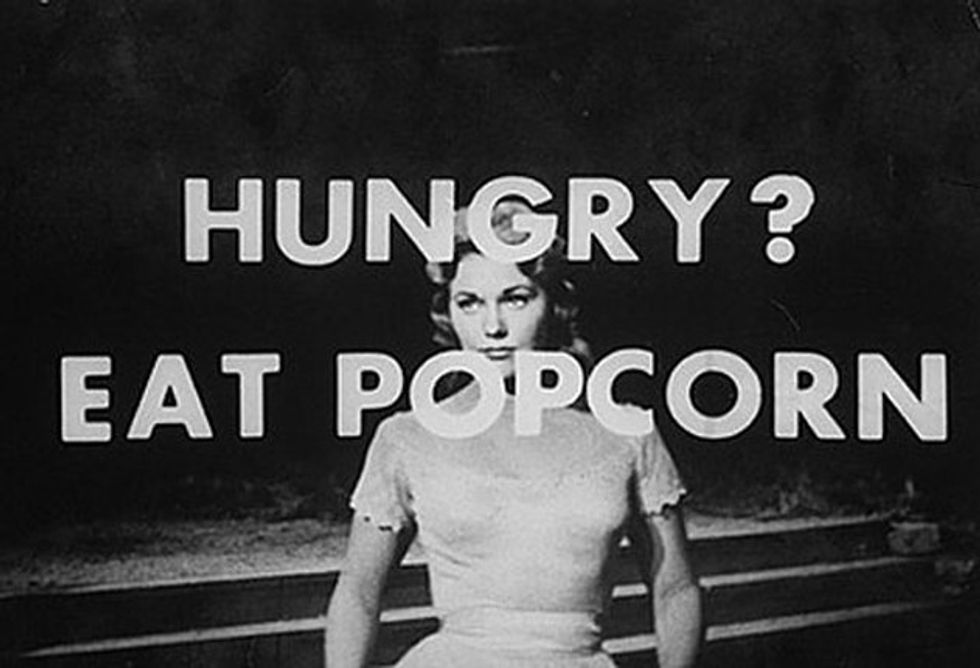Subliminal advertising is when companies hide specific images through all kinds of media that may subconsciously appeal to viewers, or at least help them to visually remember the product being showcased. Subliminal advertising started in 1957 when James Vicary (supposedly) experimentally inserted the phrases, “Hungry? Eat popcorn,” and “Drink Coca-Cola,” into a movie in hopes that the theater’s concession sales would increase. As David Mikkelson explains in his article “Subliminal Advertising” on Snope.com, “Vicary placed a tachistoscope in the theater's projection booth, and all throughout the playing of the film ‘Picnic,’ he flashed two different messages on the screen every five seconds. They each displayed for only 1/3000 of a second at a time, far below the viewers' threshold of conscious perceptibility.” According to Vicary himself, there was an 18.1 percent increase in Coca-Cola sales, and a 57.8 percent rise in popcorn purchases.
Others claim that Vicary's experiment was all a hoax and never happened in the first place, but the details seem very specific for the whole thing to be pushed aside as nonsense. It's possible that theories describing his experiment as a hoax were used as a way to prevent mass hysteria (plus the law created shortly after that required, and still requires, movies to be searched for subliminal messages), since people feared the power of these subtle advertisements in social and political decision-making, as well as in government power.
In 2006, Derren Brown– an English mentalist and illusionist– performed a famous experiment which highlights the strong effects subliminal messages can have on memory, creativity and, ultimately, everyday decisions. In this experiment, he hires two advertising artists to create an advertisement for the topic of his choice. While the artists are convinced that nothing about their situation is outside the ordinary, Brown has placed subtle images all around their taxi route from their work building to his office before asking them to perform this task.
In the video I watched on YouTube, “Subliminal Advertising Experiment with Darren Brown,” a few examples of these hidden messages come up after the experiment has been conducted and proven. They pass a zoo, a group of school kids wearing t-shirts with the logo they eventually recreate, a harp in a shop window, and the slogan they end up using conveniently written on a sidewalk chalkboard sign placed outside a random store. Not only that, but Brown also put his own drawings of the image he had in mind in specific places (these images will make more sense when you watch the video on your own, if you haven’t already).
Once the advertising artists arrive at their destination, Brown explains their task: “Imagine that I’m opening a chain of stores selling a product. Your task is to come up with a poster advertising that store. And that poster must include the company name, whatever you decide that may be, it must include a strapline or slogan, and some kind of visual image. The idea is that you only have half an hour to do this, so you must work with your first instinct.” Then, they were told they had to create this advertisement for a chain of taxidermy stores.
Without realizing, they ended up creating almost the exact same image Brown had imagined before conducting the experiment. Because of all the subliminal messages the artists absorbed without realizing, their memory, creativity, and decisions were based off those images they’d accidentally picked up on their way to Brown’s office in a taxi.Why is this important? Because, as everyone hopefully already knows, the government has more control over what we see, hear, eat, and read than seems possible. What's even worse is that the food and marketing industries, especially the large companies within, have a ton of control over the government due to the amount of money they bring to the country (and with more spending comes more taxes—see where I'm going?). As a result, these large industries have more say in what we see than U.S. citizens and government, despite demand for change. It makes me wonder how often we absorb these messages without realizing while going about our daily activities, and how our decisions are impacted by these images, songs, and even smells. Technology is becoming more and more advanced; what are the chances of the wrong person getting their thirsty hands on an opportunity to advertise a subliminal message?

























